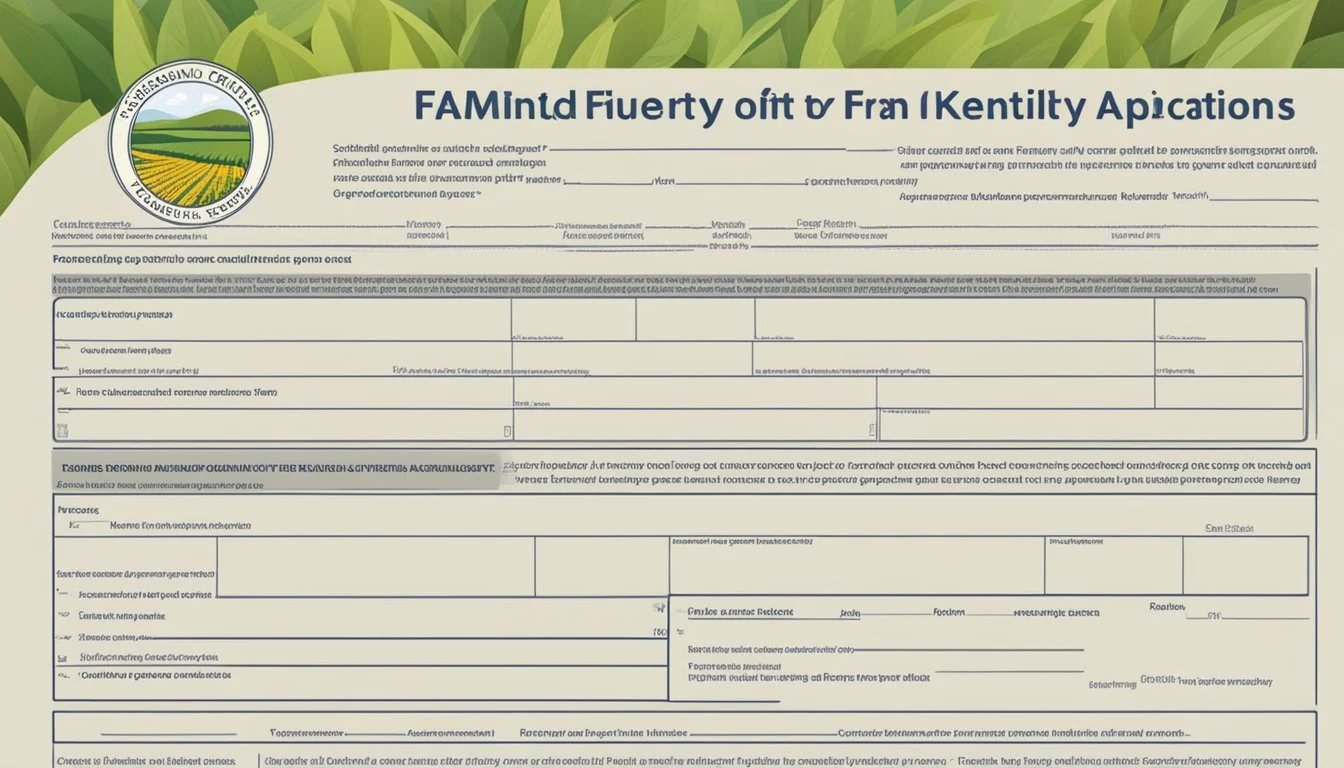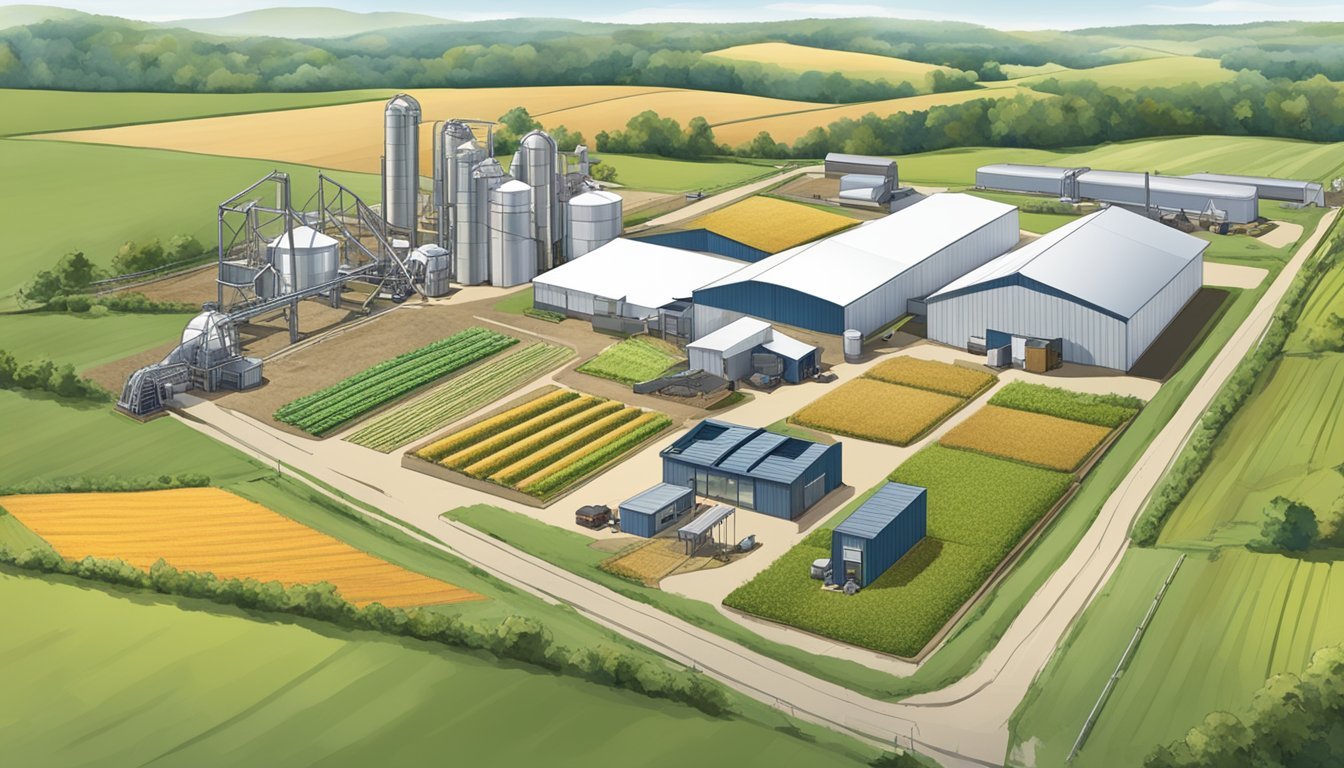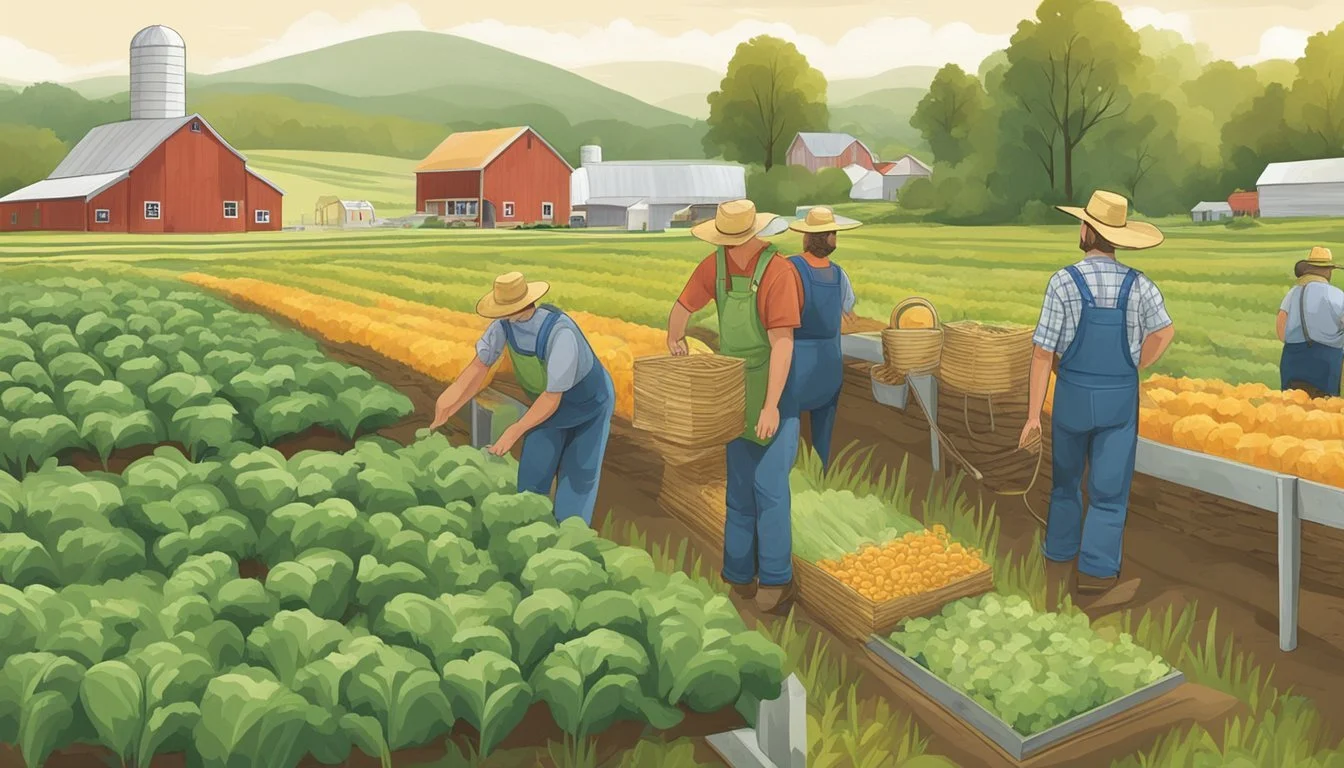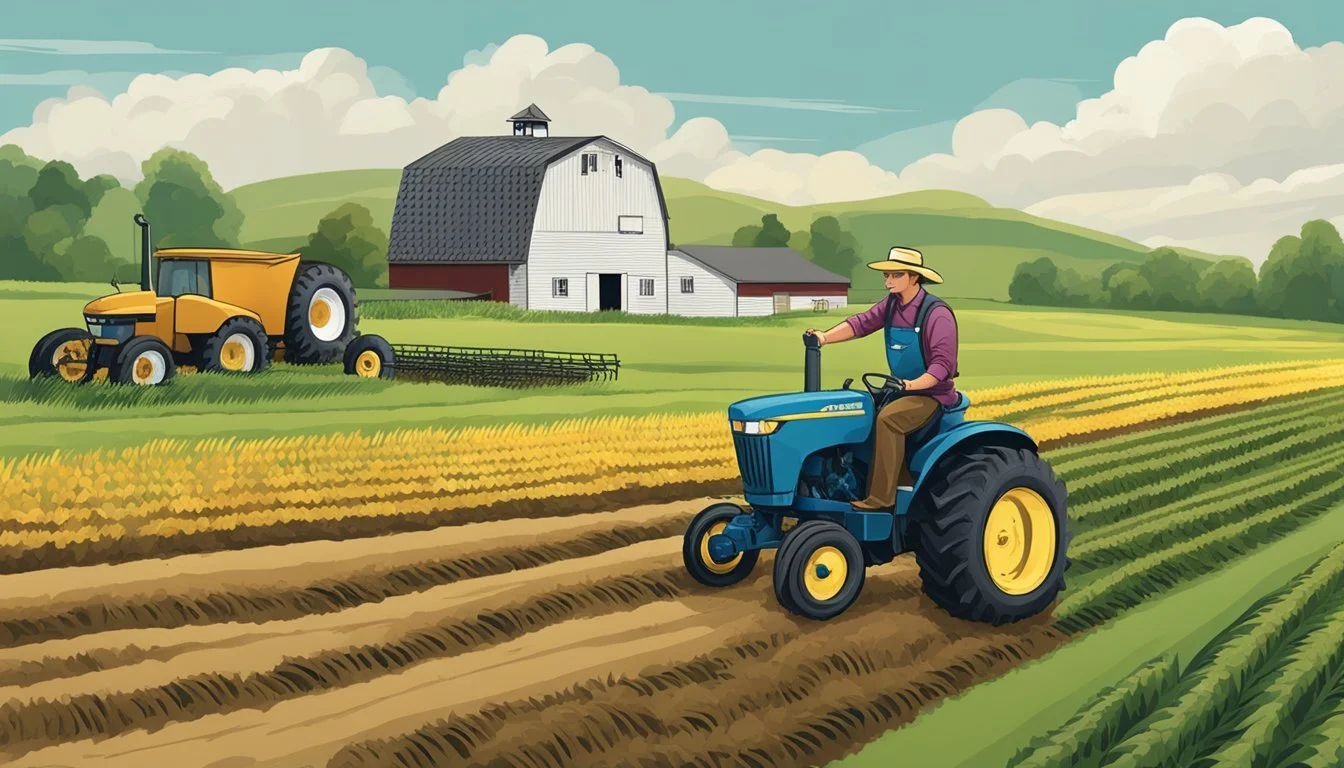Farming Grants Kentucky
Navigating Opportunities for Agrarian Aid
Farmers in Kentucky have various opportunities to access state and federal funding aimed at supporting agricultural activities. Funding opportunities include grants for initiating or expanding agricultural projects, fostering innovation, and enhancing the sustainability of farms. These grants cater to a spectrum of needs, from supporting small-scale farm operations to advancing large agribusiness endeavors. The state's commitment to agricultural development is evident through its investment in these funding programs.
The Kentucky Department of Agriculture (KDA) and other affiliated organizations, like the Kentucky Center for Agriculture and Rural Development (KCARD), play pivotal roles in providing these grants and funding opportunities. They outline specific programs that target areas such as value-added enterprise, certified organic agriculture, and integrating new agricultural technologies. By facilitating these programs, they aim to strengthen local economies and promote the longevity and prosperity of Kentucky's farming communities.
Understanding Farming Grants in Kentucky
Access to farming grants in Kentucky provides a critical avenue for agricultural growth and innovation. These grants support a diverse range of projects and initiatives, tailored to enhance the state's agricultural landscape.
Basics of Farming Grants
Grants are non-repayable funds or products disbursed by grant makers, often a government department, corporation, foundation, or trust. In the context of Kentucky agriculture, grants are designed to support farmers, agricultural businesses, and rural development. Eligibility for these grants typically requires the recipient to engage in agricultural practices or contribute to the agricultural sector. Grant funds can be used for a variety of purposes, including but not limited to, implementing new technologies, enhancing efficiency, and pursuing sustainable and environmentally friendly practices.
Kentucky-Specific Grant Programs
The Kentucky Agricultural Development Board and the Kentucky State University offer grants and programs aimed at empowering the state's agricultural community. For instance, the Kentucky Department of Agriculture provides state-funded opportunities in collaboration with partners to foster innovation.
- Energy Efficiency Grants: Offered by the Kentucky Center for Agriculture and Rural Development (KCARD), these grants range from $1,500 to $500,000 and cater to agricultural producers who derive at least half of their income from agricultural operations.
Agribusiness Grant Facilitation Program (AGFP): Also managed by KCARD, the AGFP assists Kentucky agribusinesses in learning about and applying for funding.
Kentucky Agricultural Development Fund: The fund supports a spectrum of programs including, but not limited to:
Ag Diversification
AgTech & Leadership Development
On Farm Energy Projects
Small-scale farm grants are available too, supporting priority sectors such as aquaculture, organic agriculture, and innovations in sustainable farming practices.
Entities such as the U.S. Department of Agriculture (USDA) also provide federal grants that complement state-level funding, ensuring a comprehensive support system for Kentucky's farmers and agricultural businesses. Applicants must meet specific eligibility criteria to obtain funding, which can be a pivotal step toward advancing their agricultural endeavors.
Eligibility and Application Process
In Kentucky, agricultural grants offer vital support to farming initiatives, demanding a clear understanding of eligibility and adherence to application guidelines. Securing these funds starts with a thorough assessment of eligibility criteria, followed by a meticulous application process and the utilization of resources designed to aid applicants.
Eligibility Criteria
Agricultural Producers: To be eligible for most agricultural grants, applicants typically must prove they derive at least 50% of their gross income from agricultural operations. This criterion underscores the importance of farming to their livelihood and ensures that grant support is directed to those who are actively engaged in agriculture.
Specific Programs: Different grants may have their own set of unique requirements. For example, small-scale farms, initiatives for renewable energy, and efficiency projects often have tailored criteria based on project scopes and objectives.
Application Guidelines
Application Submission: Potential applicants must follow precise instructions when submitting grant applications. It is recommended that they:
Register on Grants.gov for federal programs or use state-provided platforms for local grants.
Prepare a detailed business plan showcasing the viability of their agricultural project.
Develop comprehensive proposals that clearly articulate the objectives, methods, and expected outcomes of their farming initiative.
Planning Projects: A rigorous planning phase is advised, entailing:
Project Budgeting: Clearly outline the financial aspects, including the amount requested and a breakdown of how funds will be used.
Project Timelines: Define the timeline for implementation and completion.
Resources for Applicants
Support Materials: Resources such as guidelines, FAQs, and contact information for grant support personnel are made available to assist applicants throughout the process.
Resources Include:
Grant Program Portals: Centralized information on eligibility, funding amounts, and application deadlines.
Educational Outreach: Opportunities for training or educational materials, which can sometimes be funded as part of the grant.
Empowerment Through Knowledge: Effectively navigating the application process benefits significantly from understanding the resources provided, often detailed on the Kentucky Center for Agriculture and Rural Development website and similar entities.
Grant Opportunities for Diverse Farming Operations
Kentucky offers a range of grant opportunities designed to support diverse farming operations. These programs focus on small-scale farms, organic agriculture, and livestock ventures, providing essential funds for growth and innovation.
Small-Scale Farm Grants
Small-scale farm grants in Kentucky support a variety of farming operations. Kentucky State University administers a program assisting farms with initiatives in Value-Added Enterprise, Certified Organic Agriculture, Agroforestry/Specialty Crops, Food Systems Resiliency, and Emerging Agricultural Technologies. These grants encourage farmers to diversify and modernize, using funds for production-related implements and agricultural knowledge expansion.
Organic and Sustainable Agriculture
For farms pursuing certified organic agriculture or advancing sustainable farming practices, Kentucky provides financial backing. This includes support for practices like aquaponics that merge aquaculture and hydroponics, promoting efficient and eco-conscious food production systems. These opportunities enable farmers to invest in operations that align with environmental stewardship and sustainability goals.
Livestock and Aquaculture Support
Kentucky values its livestock and aquaculture sectors, offering specific grants aimed at enhancing these operations. Funding is often available to develop aquaculture systems, which may include raising fish or other aquatic organisms. By subsidizing such ventures, these grants aid in increasing the efficiency and productivity of Kentuckian livestock and aquaculture farming operations.
Maximizing Grant Usage
To ensure financial success and growth in the agricultural sector, farmers and agribusinesses in Kentucky should exploit available grants effectively. This requires strategic business and financial planning, expanding market reach, and investing in education and training.
Business and Financial Planning
Developing a robust business plan is essential for grant applicants. It provides a clear roadmap for sustainable growth and financial health. Kentucky farmers can seek technical assistance from entities such as the Kentucky Center for Agriculture and Rural Development (KCARD) to fine-tune their business strategies. A detailed plan should outline:
Projected revenues and expenses: This helps set realistic financial goals.
Risks and opportunities: Identification and mitigation of risks can improve a business's chances of success.
Marketing and Sales Expansion
Effectively utilizing grants for marketing can lead to significant sales growth. The Kentucky Proud Promotional Grant aids eligible members by reimbursing up to 50 percent of marketing costs. To maximize this opportunity, marketing efforts should:
Target appropriate audiences: Understanding demographics is key for effective marketing campaigns.
Highlight unique aspects of the product: Differentiation can boost sales in a competitive market.
Education and Training Programs
Continuous learning and skill development are critical for modern farming success. Educational programs and farmer education assistance can lead to innovative practices that enhance productivity. Kentucky offers various grants and initiatives for education, including:
AgTech & Leadership Development: This prepares farmers to incorporate technological advancements.
Innovative Ag Systems: Supports unconventional farming methods that may increase farm efficiency.
Infrastructure and Equipment Funding
Kentucky offers various grants designed to improve the agricultural sector's infrastructure and equipment. These funds enhance the state's food systems by supporting projects related to storage, processing, and the purchase of essential farming supplies and equipment.
Storage and Processing Facilities
The Resilient Food Systems Infrastructure (RFSI) program, supported by the Kentucky Department of Agriculture (KDA) with $8.6 million from the USDA, provides funding particularly for storage and processing facilities. These funds aim to build resiliency across Kentucky's food supply chain. Eligible projects may include the construction or upgrade of permanent structures for storing and processing farm products.
Storage: Includes buildings like barns and silos.
Processing Facilities: Can range from slaughterhouses to dairy processors.
Farm Equipment and Supplies
With grants like the Energy Efficiency Grants offering between $1,500 to $500,000, agricultural producers and small businesses in eligible rural areas can invest in farm equipment and supplies. While grants typically do not cover land purchases or non-farm equipment, exceptions exist for items that directly improve the agricultural operations' energy efficiency and productivity.
Farm Equipment: This encompasses tractors, plows, seeders, and harvesters.
Supplies: Could refer to fencing, irrigation systems, nutrient management systems, and high tunnels.
These grants support not only non-motorized tools but also motorized vehicles essential to modern farming. The objective is to promote sustainable practices, energy efficiency, and robust production systems within Kentucky's agricultural framework.
Specialized Funding Opportunities
In Kentucky, farmers have access to tailored grants and programs that support energy sustainability and assist in times of crisis. These funds are crucial for maintaining farm operations' efficiency and overcoming challenges related to natural disasters.
Energy Efficiency and Conservation
Under the Rural Energy for America Program (REAP), agricultural producers with at least 50% of their gross income from agricultural operations can secure funding. Grants range from $1,500 to $500,000, offering substantial support for energy efficiency improvements.
Eligibility: Small businesses in qualified rural areas
Use of Funds:
Installation of renewable energy systems (solar, wind, geothermal, etc.)
Energy efficiency improvements (HVAC systems, insulation, lighting upgrades)
Benefits:
Cost Savings: Lower energy bills
Environmental Impact: Reduction in carbon footprint
Disaster Relief and Emergency Programs
Farmers facing the adverse effects of natural disasters can turn to several programs for aid. These include assistance with feed, seed, and fertilizer costs, ensuring that operations can continue despite unforeseen setbacks.
Programs: Various, depending on the disaster and impact
Support Types:
Immediate relief funding
Long-term recovery grants
Strategic Relief:
Recovery: Assistance in rebuilding structures and purchasing necessary supplies
Prevention: Measures to mitigate future disaster impacts
Note: The above programs are subject to availability and specific terms set by the State of Kentucky and Federal agencies. Applications must be submitted in accordance with the guidelines and deadlines of each grant or funding opportunity.
Local and Community Initiatives
Kentucky's local food systems are being reinforced through initiatives such as "Farm to Fork" and promotional support by "Kentucky Proud", which are targeted at enhancing community health and market reach for local agricultural products.
Farm to Fork Programs
The Farm to Fork initiative is a Kentucky Proud program that focuses on partnerships with local organizations to boost recognition of Kentucky Proud foods. These partnerships lead to increased local food awareness while also benefiting local charities within the community. Agricultural fairs and other similar events often serve as platforms for these initiatives, which aim to connect consumers with local farmers, showcase local produce and reinforce the buy local movement.
Objectives: Increasing local food awareness and supporting community charities.
Method: Engaging with local organizations and hosting community events.
Kentucky Proud Promotional Support
The Kentucky Proud Promotional Grant is available to members who seek to advertise and market their local agricultural products. Farmers can receive reimbursement for up to 50 percent of eligible expenses related to these activities. The grant is crucial in reaching consumers directly, thus bolstering the local food systems and enhancing the market for Kentucky Proud foods.
Reimbursement Rate: Up to 50 percent of eligible promotional expenses.
Purpose: To increase direct consumer marketing of Kentucky Proud products.
Both these initiatives support Kentucky's dedication to farm-to-table connections and emphasize the importance of local community involvement in sustaining the state's agricultural heritage.
Support Services and Legal Assistance
In Kentucky, farmers have access to a variety of support and legal services aimed at bolstering agricultural productivity and sustainability. These services offer invaluable assistance from advisory and consulting to navigating legal challenges.
Advisory and Consulting Services
Farmers in Kentucky may benefit from the consulting services provided by the Kentucky Department of Agriculture (KDA) and the Center for the Sustainability of Farms and Families. These organizations offer insights into best practices for farm operations, financial advice, and strategies for improving yield. In particular, the Center for the Sustainability of Farms and Families provides specialized assistance to address the unique challenges faced by the agricultural community.
Legal Services for Farmers
Legal assistance is available through the KDA's Office of Legal Services and partner organizations. Legal services focus on issues such as land acquisition, estate planning, conflict resolution, and regulatory compliance.
Kentucky Department of Agriculture: Offers access to legal support and resources tailored to the unique needs of the farming community.
Kentucky Animal Control Board: Collaborates with KDA to address legal matters related to livestock and animal husbandry.
The support and legal services are implemented to protect farmer's interests and to ensure that they operate within the framework of agricultural law.
Looking Ahead
As Kentucky's agricultural sector evolves, a focus on growing innovation and fostering entrepreneurship among new and small-scale farmers is paramount. Access to funding for energy-efficient projects and a developing marketability for organic produce are key currents shaping the horizon.
Emerging Trends in Agriculture
Kentucky's agricultural landscape is witnessing an upsurge in innovative practices and sustainable farming. Grants from the Kentucky Department of Agriculture underscore this by supporting projects that integrate modern technology into farming operations. Renewable energy initiatives offer farmers substantial funding opportunities, with grants ranging from $1,500 to $1 million, depending on the project scale. Beginning farmers and small-scale operations stand to benefit significantly as trends lean towards energy efficiency and organic production.
Renewable Energy System Grants: $2,500 to $1 million
Energy Efficiency Grants: $1,500 to $500,000
These trends not only enhance the sustainability of farms but also their marketability to consumers who increasingly value eco-friendly and locally sourced foods.
Policy Developments and Future Funding
Policy shifts within the Kentucky agricultural sphere are continually redefining future funding opportunities. The Kentucky Agricultural Development Fund is poised to direct financial resources towards areas identified as priority, which may include agricultural diversification and leadership programs tailored to transforming Kentucky's food systems. It is imperative for farmers, especially those entering the agribusiness sector, to stay informed about these policy developments, as they often dictate the availability and specifics of grant opportunities.
Priority Areas for Future Funding
On-Farm Energy Efficiency
Agricultural Diversification
Leadership Development for New Farmers
These pillars of policy and funding align with global trends and consumer demands, thereby fortifying the state's agricultural economy. By closely monitoring policy updates, farmers can strategically align their projects to increase their eligibility for grants and secure the financial support necessary to advance their farming practices.









